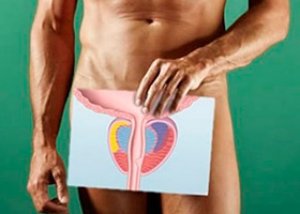
All iLive content is medically reviewed or fact checked to ensure as much factual accuracy as possible.
We have strict sourcing guidelines and only link to reputable media sites, academic research institutions and, whenever possible, medically peer reviewed studies. Note that the numbers in parentheses ([1], [2], etc.) are clickable links to these studies.
If you feel that any of our content is inaccurate, out-of-date, or otherwise questionable, please select it and press Ctrl + Enter.
What is prostatitis?
Medical expert of the article
Last reviewed: 05.07.2025

Today, prostatitis is the most common disease of the male reproductive system. The ailment manifests itself in the form of inflammation of the prostate gland and is accompanied by tissue edema. According to statistics, the number of men over 30 suffering from this disease is 30%, over 40 - 40%, over 50 - 50%, etc.
The site of the lesion
The prostate gland in men is a glandular-muscular organ located under the bladder in the pelvis. The gland is in close contact with the urethra, the initial area of the urethra. The main and very important function of the prostate gland is to produce a secretion that mixes with seminal fluid, thereby supporting the activity of spermatozoa and increasing their resistance to various adverse factors. Under the influence of various factors, the activity of the prostate (prostate gland) is disrupted - prostatitis occurs.
What causes prostatitis?
There are 4 categories of prostatitis: acute bacterial, chronic bacterial, non-bacterial and prostatodynia.
Acute bacterial prostatitis occurs as a result of infections introduced into the body. These include trichomoniasis, chlamydia, gonorrhea, gardnerellosis. Bacteria enter the prostate through the bladder, rectum, urethra, lymphatic and blood vessels of the pelvis.
The causes of non-bacterial prostatitis have not yet been specifically established, but there is an opinion that the presence of bacteria in this form of the disease is absolutely not excluded. Researchers of the disease believe that factors that provoke prostatitis can be neglected and untreated infectious diseases, disorders in the blood circulation of the prostate due to a sedentary lifestyle, impaired nervous regulation of the pelvic organs, etc.
Prostatodynia is a neurovegetative disorder of the prostate gland. Just like nonbacterial prostatitis, prostatodynia occurs for reasons that are still not specifically known. The bacterial factor is almost excluded due to the unsatisfactory consequences of treating the disease with antibacterial agents. There are several opinions about the sources of prostatodynia, namely:
- psychological factor;
- bladder neck anomalies;
- dysfunctional urination process occurring under high pressure;
- urethral stricture;
- disorders in the neuromuscular apparatus of the pelvic diaphragm and perineal muscles;
- reverse flow of secretion that does not go beyond the prostate gland, caused by anatomical features of the body, high pressure during urination, turbulent urine flow.
How does prostatitis manifest itself?
The main symptoms of non-bacterial prostatitis are painful urination, pain in the groin, pelvis and genitals, decreased libido, impotence, etc.
Symptoms of prostatodynia include painful ejaculation, pain in the perineum, frequent urination, and urinary disorders.
What are the consequences of prostatitis?
Prostatitis that is not detected in time and left untreated is fraught with the following consequences:
- infertility;
- the transition of acute prostatitis into a chronic form;
- recurrent cystitis;
- bladder obstruction with urinary retention factor (requires surgical intervention);
- narrowing, scarring of the urethra;
- suppuration (abscess) of the prostate (requires surgical intervention);
- kidney disease, pyelonephritis;
- sepsis, especially dangerous in patients with renal failure, diabetes).
How is prostatitis treated?
If acute bacterial prostatitis is not treated thoroughly and seriously, it can develop into a chronic bacterial form. In this case, treatment will be longer and will not guarantee a full recovery. Antibacterial therapy aimed at eliminating the infection is prescribed as treatment, and then immunotherapy to restore the body after taking medications. The urologist prescribes the dosage and regimen for taking medications individually, depending on the presence of a specific infection and the degree of neglect of the disease.
As a treatment for patients with this form of the disease, antibiotics are prescribed, despite the fact that this type of prostatitis is not characterized by an infectious side. The most effective treatment is alpha-blockers - they are able to relax the muscles of the prostate gland. In addition, such prostatitis is treated with rectal drugs that have anti-inflammatory properties - they reduce the growth of gland tissue and improve the patient's well-being.
Often, in conjunction with drug treatment, the urologist prescribes restoration of the patient's body by taking immunomodulators, sedatives, agents that improve microcirculation, etc.
Prostatitis of this type is more difficult to treat than other forms, since the exact causes of the disease are not clear. Antibacterial therapy in this case is ineffective and is prescribed very rarely. Alpha blockers, anti-inflammatory drugs, vitamins, muscle relaxants are used more often.
Sometimes doctors advise their patients to avoid fried and spicy foods, alcohol, smoking, and certain activities, such as cycling – doctors tend to believe that these and many other factors can aggravate the course of the disease.
How to prevent prostatitis?
Any disease can be prevented if you follow simple rules. Prostatitis will not occur in a person who does not allow himself to sit on cold stones or iron, does not abuse alcohol and smoking, does not eat excessively spicy, smoked, canned and fried food, has regular sexual intercourse, protects himself from promiscuous sexual relations, often has vegetables and fruits in his diet, plays sports and regularly, at least once a year, visits the urologist's office.

